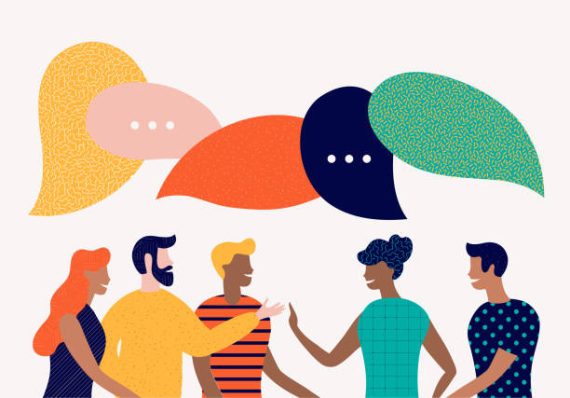
By M M Owen
is a British nonfiction author. He obtained his PhD at the University of British Columbia, and now splits his time between the UK and Portugal.
Edited byPam Weintraub
Source: Aeon.com
Writing in Esquire magazine in 1935, Ernest Hemingway offered this advice to young writers: ‘When people talk, listen completely… Most people never listen.’ Even though Hemingway was one of my teenage heroes, the realisation crept up on me, somewhere around the age of 25: I am most people. I never listen.
Perhaps never was a little strong – but certainly my listening often occurred through a fog of distraction and self-regard. On my worst days, this could make me a shallow, solipsistic presence. Haltingly, I began to try to reach inside my own mental machinery, marshal my attention differently, listen better. I wasn’t sure what I was doing; but I had crossed paths with a few people who, as a habit, gave others their full attention – and it was powerful. It felt rare, it felt real; I wanted them around.
As a culture, we treat listening as an automatic process about which there is not a lot to say: in the same category as digestion, or blinking. When the concept of listening is addressed at any length, it is in the context of professional communication; something to be honed by leaders and mentors, but a specialisation that everyone else can happily ignore. This neglect is a shame. Listening well, it took me too long to discover, is a sort of magic trick: both parties soften, blossom, they are less alone.
Along the way, I discovered that Carl Rogers, one of the 20th century’s most eminent psychologists, had put a name to this underrated skill: ‘active listening’. And though Rogers’s work was focused initially on the therapeutic setting, he drew no distinction between this and everyday life: ‘Whatever I have learned,’ he wrote, ‘is applicable to all of my human relationships.’ What Rogers learnt was that listening well – which necessarily involves conversing well and questioning well – is one of the most accessible and most powerful forms of connection we have.
The paucity of my listening powers dawned on me as a byproduct of starting to meditate. This is not to make some claim to faux enlightenment – simply to say that meditation is the practice of noticing what you notice, and meditators tend to carry this mindset beyond the yoga mat, and begin to see their own mind more clearly. Among a smorgasbord of other patterns and quirks, what I saw was a self that, too often, didn’t listen.
The younger me enjoyed conversation. But a low, steady egoism meant that what I really enjoyed was talking. When it was someone else’s turn to talk, the listening could often feel like a chore. I might be passively absorbing whatever was being said – but a greater part of me would be daydreaming, reminiscing, making plans. I had a habit of interrupting, in the rather masculine belief that, whatever others had to say, I could say better for them. Sometimes, I would zone out and tune back in to realise that I’d been asked a question. I had a horrible habit, I saw, of sitting in silent linguistic craftsmanship, shaping my answer for when my turn came around – and only half-listening to what I’d actually be responding to.
The exceptions to this state of affairs, I began to see, were situations where there existed self-interest. If the subject was me, or material that might be of benefit to me, my attention would automatically sharpen. It was very easy to listen to someone explaining what steps I needed to take to ace a test or make some money. It was easy to listen to juicy gossip, particularly of the kind that made me feel fortunate or superior. It was easy to listen to debates on topics where I had a burning desire to be right. It was easy to listen to attractive women.
On bad days, this attentional autopilot constricted me. On topics of politics or philosophy, this made me a bore and a bully. People avoided disagreeing with me on anything, even trivial points, because they knew it would balloon into annoyance and a failure to listen to their reasoning. In my personal life, too often, I could forget to support or lift up those around me. The flipside of not listening is not questioning – because, when you don’t want to listen, the last thing you want to do is trigger the exact scenario in which you are most expected to listen. And so I didn’t ask my friends serious questions often enough. I liked jokes, and I liked gossip; but I’d forget to ask them the real stuff. Or I’d ask them things they’d already told me a week ago. Or forget to ask about their recent job interview or break-up.
This is where bad listening does the most damage: it signals to the people around you that you don’t care about them, or you do but only in a skittish, flickering sort of a way. And so people become wary of opening up, or asking for advice, or leaning on you in the way that we lean on those people we truly believe to be big of heart.
All of the above makes for rather a glum picture, I know. I don’t want to overstate things. I wasn’t a monster. I cared for people and, when I concentrated, I could show it. I was liked, I made my way in the world, I apparently possessed what we call charisma. Plenty of the time, I listened fine. But this may be precisely the point: you can coast along in life as a bad listener. We tend to forgive it, because it’s common.
Kate Murphy, in her book You’re Not Listening (2020), frames modern life as particularly antagonistic to good listening:
[W]e are encouraged to listen to our hearts, listen to our inner voices, and listen to our guts, but rarely are we encouraged to listen carefully and with intent to other people.
Read the entire article here: https://aeon.co/essays/the-psychologist-carl-rogers-and-the-art-of-active-listening

